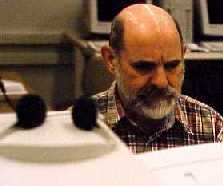We learned that initially offering large group workshops worked well to introduce a number of the faculty to the available technologies and to demonstrate possible pedagogical applications. What quickly became clear to us, though, after the first year and a half, was that to move technological comfort beyond the "early adopters," we would need to offer one-on-one support. This approach appealed to a variety of faculty -- those who were reluctant to explore technology in their teaching because they were intimidated by it, those who were resistant because they saw little potential for their own use, and those who were more advanced than the majority and needed just a bit of support and encouragement as well as a place to experiment (with someone available to offer guidance or to answer question).
 We set this up by using a
We set this up by using a ![]() consulting manager and enlisting those who had been trained in the intensive summer workshops as peer consultants. In the spring semester of 1999, ten consultants logged nearly 50 hours of meetings with their colleagues, offering instructional support in
FirstClass, CommonSpace, Daedalus Integrated Writing Environment; PowerPoint presentation software, MS Word, using the ELMO, VIS systems, projection units, and the departmental tech carts. Consultants also assisted with building web pages, using email in pedagogy,and some desktop publishing. In addition, consultants helped faculty begin working on developing electronic portfolios for their teaching portfolios as well as using them in the courses they taught. We also took this consulting model to a larger context, creating a 4-day hands-on institute for local k-16 teachers.
consulting manager and enlisting those who had been trained in the intensive summer workshops as peer consultants. In the spring semester of 1999, ten consultants logged nearly 50 hours of meetings with their colleagues, offering instructional support in
FirstClass, CommonSpace, Daedalus Integrated Writing Environment; PowerPoint presentation software, MS Word, using the ELMO, VIS systems, projection units, and the departmental tech carts. Consultants also assisted with building web pages, using email in pedagogy,and some desktop publishing. In addition, consultants helped faculty begin working on developing electronic portfolios for their teaching portfolios as well as using them in the courses they taught. We also took this consulting model to a larger context, creating a 4-day hands-on institute for local k-16 teachers.
This semester (Fall 2000), we are continuing to provide one-on-one consulting and, in response to a needs survey, a series of Friday afternoon and Saturday sessions. One surprising fact has developed: the Fall 2000 needs survey reveals that the faculty actually want more non-technology faculty development sessions. Many of them feel comfortable enough with the technology in their teaching that they now want to focus on developing pedagogy, assessment/evaluation, professionalization. The respondents who indicated a desire for technology sessions preferred sessions that were tailored to individual teaching needs. On reflection, we believe that this indicates an internalization of, an acceptance of, the presence of the technologies in the classrooms, and that the faculty are now ready to move beyond "training" to exploration and realization of the potential for new ways of learning for them as well as their students.